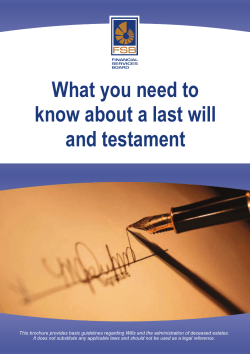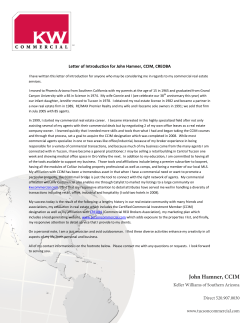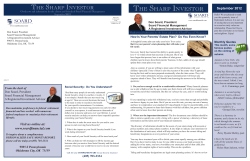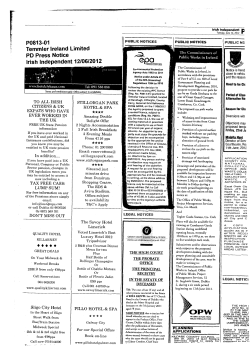
Document 68220
Estate Planning Tasmania News Issue 8 June 2009 Will Tips In this Issue Future planning for children with disabilities • Determining “domicile” • Testator’s Family Maintenance claims • Our regular features • • Future planning for children with disabilities • • Typically, parents of children with disabilities will be the main or sole decision makers for those children during their childhood and sometimes in adult life. Part of that decision making is to provide by their own Will and other necessary arrangements provisions that will apply after their own death. There are always difficult decisions for parents who want to properly provide for any child who is under a special disadvantage because of a disability. There are a wide range of estate planning techniques that can assist in the proper protection of a disabled child’s interest. Parents of children with disabilities generally have the opportunity during their lifetime to provide additional assistance required as a consequence of the child’s disability, such as financial assistance. This will often include accommodation with the parent. Future planning, and estate planning for parents includes planning for practical circumstances where one or both parents won’t be alive. It requires planning at a fixed point in time, subject to a review of arrangements over time, but the end result will be very different to decision making by a parent during their lifetime. It requires regular review. As a Willmaker will not themselves be in a position to make decisions at the relevant time, they need to put in place arrangements they consider to be essential and ensure appropriate people are given the care and control of both the responsibility for their child and the responsibility for financial matters, and sufficient flexibility is left to those who will be administering the arrangements to cope with changing needs and circumstances of the disabled person. (Continued on page 2) Make sure that, if it is your intention, you allow for the birth of future children and/ or grandchildren in your Will. Seek advice about the consequence of any survivorship periods affecting your Will. Clearly describe items that you wish to specifically gift to someone in your Will. Recent/Pending Legislation & Cases • The Family Court and Federal Magistrates Court now have jurisdiction to hear de facto property cases. • The decision of the Federal Court in Bamford v Comm of Taxation has important ramifications for taxation of trusts. • The costs decision of Adkins v Adkins has reinforced the risks faced by a party to a family provision claim who makes allegations that they cannot prove—they had to pay substantial legal costs. Our Firm News • Kate Moss has commenced Taxation Institute of Australia Foundation Tax course. Asked and Answered: Q. How much will it cost to administer my estate when I die? A. This will depend in part on who your Executors are and if they charge Executor’s commission. It is always Kate Smith more expensive when the Executors charge Executor’s commission. The Public Trustee, Tasmanian Perpetual Trustees Limited and all interstate trustee companies charge Executor’s commission. The Wills we prepare are in a form that does not permit our firm to charge Executor’s commission and as a consequence our fees are generally significantly lower than trustee institutions. The actual costs of administering an estate depend on the level of involvement of lawyers, the work required to be undertaken, and the number and complexity of the assets in the Estate. © Peter Worrall Lawyers Page 1 Estate Planning Tasmania News Issue 8 June 2009 Future planning for children with disabilities (Continued on page 1) Good estate planning offers parents the opportunity to obtain the peace of mind that comes with knowing that the best possible arrangements that can be made, have been made. This is more likely to lead to the child having a future of the quality that they would have had if their parents were still alive. Failure to put in place a Will of the type referred to above can result in devastating and inappropriate results for families where a child has special needs. There are estate planning opportunities that can provide significant benefit to the child. Glossary Family Provision Some people can seek from the Court a change to what a person receives - either a share when none has been given, or a greater share of an estate after the death of a person under these laws. These laws are different in each State and Territory, especially about who is entitled to make a claim. Gift The provision of an asset under a Will. Sam McCullough Determining “domicile” Determining the “domicile” of a willmaker is essential to understanding how the laws of a particular jurisdiction will apply to an estate after death. Whilst most clients will be domiciled in the place in which they live, this should not be assumed. A person’s “domicile” (for the purposes as between the States and Territories of Australia) is governed by the Domicile Act 1980 Tasmania, and similar interstate legislation, which modifies, but does not entirely codify the common law position. A person can only have, and must at all times have, one domicile. This can be a domicile of origin (birth), or a domicile of choice (where the person decides to establish a new place of residence indefinitely). There is a presumption that a person’s domicile of origin continues. The relevant “domicile” for most clients will be which State or territory of Australia in which they are a resident. Indications that a client’s domicile may be otherwise include: a client who has migrated to Australia, a client born interstate, a client who owns assets (particularly property) interstate or overseas, and a client who has close family living interstate or overseas. Guardian There are three different meanings of Guardian: The first is a testamentary guardian. This is a person appointed under a Will to be the Guardian of the Willmaker’s children who are under 18 years of age at the death of the Willmaker. Note that the Family Court can override this provision. The second is the Guardian appointed under a testamentary discretionary trust and this person will have some powers in relation to the Trustee and Trust Assets, or the views of the Guardian may have to be considered by the Trustee. The third is a Guardian appointed by a person to make medical and lifestyle decisions when the person becomes incapable to do so. Kate Moss A note from our Comm ercial Practice Group - Superannuation and Installment Warrants A growing area of interest and concern for self managed superannuation funds is the availability of loan funds through instalment warrants and similar arrangements. Recent changes to how the Superannuation Industry (Supervision) Act 1993 is interpreted and enforced now allows for superannuation funds to borrow money for investment purposes under certain conditions and controls. That change has produced a growing rate of investment, particularly in real property assets, by funds using the instalment warrant system. The requirements for superannuation funds that intend to borrow funds for investment purposes are highly regulated and may not be available to all funds as the trust deed of some funds may prohibit borrowing altogether. Strict adherence to the regulations is also essential, as a failure to properly comply may affect the compliance status of the fund and produce unfavourable taxation consequences. All trustees who are considering borrowing funds for investment purposes should obtain independent legal, accounting and financial advice about instalment warrants before entering into any contract to purchase real property in a superannuation fund. If you require further information, please do not hesitate to contact us. Matthew Pawson © Peter Worrall Lawyers Page 2 Estate Planning Tasmania News Issue 8 June 2009 Testator’s Family Maintenance claims—claim for further distribution for an estate One of our clients has given us permission to reveal an aspect of one of her files. The details below show her attitude to arriving at a settlement suitable to her. We recently acted for an adult child who was left without provision under the Will of her late Mother. We commenced proceedings under the Testator’s Family Maintenance Act 1912 (Tasmania) for her, seeking provision for our client from her Mother’s estate. After a series of procedural hearings, and the filing of affidavit material in Court, an Offer of Compromise was put to our client by the executor and beneficiary of the estate through our firm. The offer was accepted by our client. After reflecting on the financial benefits achieved by the settlement that resulted from the Offer of Compromise, the client then wrote to us: “I feel the Offer of Compromise gives me the recognition I have sought and I can now move forward with my life.” These words reveal that bringing a Testator’s Family Maintenance claim on behalf of a client is not always solely about the financial benefits that we can achieve for them and their families. It is also about clients obtaining the recognition and acknowledgment that they seek as an omitted beneficiary of their loved one’s estate. Moral duty and fulfilment of that duty are fundamental. When acting for clients we aim to identify and fulfil their particular objectives that are often unique to them. These may be both financial and/or non-financial. Kate Smith Our Estate Practice Group contacts Peter Worrall Sam McCullough Kate Smith Rebecca Wilson-Roberts Partner Ph: 6223 8899 peter@pwl.com.au Senior Associate Ph: 6223 8899 sam@pwl.com.au Associate Ph: 6223 8899 kate@pwl.com.au Paralegal Ph: 6223 8899 rebecca@pwl.com.au Our Commercial Practice Group contacts Matthew Pawson Kate Moss Partner Ph: 6223 8899 matthew@pwl.com.au Lawyer Ph: 6223 8899 katemoss@pwl.com.au Alex Saunders Paralegal Ph: 6223 8899 alexsaunders@pwl.com.au Further Information Our Website: A wealth of information in relation to estate and commercial matters can be found at our website www.pwl.com.au Contributions: Contributions and suggestions from Estate Planning News readers are always appreciated. Caution: Email us at sam@pwl.com.au This newsletter contains material for general educational purposes and is not designed to be advice to any particular person in relation to their own affairs as it does not take into account the circumstances of the reader as an individual. It is recommended that appropriate professional advice be obtained by each reader so that reliance can be taken upon that advice. Subscribe or Unsubscribe: To subscribe a client or colleague, or to unsubscribe from this service, please email us at info@pwl.com.au © Peter Worrall Lawyers Page 3
© Copyright 2025

















